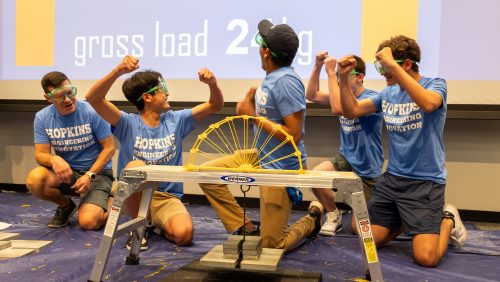EEI is a college-level summer program where you learn to think creatively, build boldly, and solve problems like a real engineer. And you can earn three college credits from Johns Hopkins University—ranked No.7 among national universities and No.13 in best undergraduate engineering programs by U.S. News & World Report.
Created by Johns Hopkins Engineering faculty with curious students like you in mind, EEI is an interactive multi-week course offered in hybrid, online, and in-person formats in Baltimore, Maryland, and locations across the country.
Unsure exactly which field of engineering sparks your interest? That’s the point of EEI—this pre-college program offers a great opportunity for you to explore a variety of topics and disciplines in civil, chemical, electrical, computer, mechanical engineering, and materials science.
Along the way, you’ll build connections with students from around the world who share your passion for design, math, science, and technology, and experience what it’s like to learn in a college environment.
Course Content and Projects
More than a summer of projects, EEI is your chance to dive into what it means to problem-solve like an engineer. Through interactive projects, you’ll tackle hands-on challenges that bring engineering concepts to life. Working in small teams, you’ll strengthen critical thinking and communication skills that prepare you for college and beyond. As you explore multiple engineering disciplines, you’ll see how they intersect and gain real insight into potential majors and career paths—helping you make confident, informed decisions about your future in engineering.
Start building the confidence and mindset of an engineer. Here are a few of the hands-on projects you’ll take on.
Spaghetti Bridge Project
Put your knowledge of engineering to the test by designing and building a spaghetti bridge. Start by measuring the strength of spaghetti in tension, bending, and compression. Use an online simulator to calculate the forces in each part of a truss, then build your design with spaghetti, adhesive, and a wooden loading platform. How much weight will it hold before it breaks? Grab your safety goggles—the results may be spectacular!
Electronics Project
Explore computer programming in small groups as you use a Circuit Playground Express (CPX) to create a memory game inspired by Simon. With multiple built-in inputs and outputs, the CPX can be programmed in different languages—from drag-and-drop to text-based coding—giving you flexibility as you bring your game to life.
Chemical Processes Lab
For large-scale production, engineers design and manage chemical processes that are safe, efficient, and cost-effective. You’ll do the same on a smaller scale: convert cornstarch into fermentable sugars and estimate the efficiency of the process, putting chemical engineering principles into practice.
Want a closer look at everything you’ll experience?
You can review past syllabi for detailed information about course content, labs, grading, and more.
Compare Program Formats
Whether you study on campus at residential or commuter sites nationwide, or learn from home, Engineering Innovation empowers you to start making your own way in the world.
Find the Program That Fits You
Each format offers the same rigorous, hands-on curriculum taught by Johns Hopkins Engineering instructors and faculty, but the experience you have outside the classroom sets each option apart.
 Hybrid: The Best of Both Worlds
Hybrid: The Best of Both Worlds
Want the flexibility of learning from home and the chance to live like a college student? With the Hybrid program, you’ll start online, building connections with classmates, and diving into your classwork. Then you’ll bring your new skills to life on campus and experience labs, teamwork, and the independence of living and learning at Johns Hopkins University.
 In-Person: Residential or Commuter
In-Person: Residential or Commuter
Life on campus starts here. Spend four weeks in an exciting on-campus environment where you’ll balance time, coursework, and independence. Live in the residence halls and explore college life before you graduate high school or commute daily to enjoy the same classroom and lab experience while staying at home.
 Online Synchronous: Learn from Anywhere
Online Synchronous: Learn from Anywhere
Have a hundred and one things you want to do this summer? Our synchronous online format makes room for all of them. From the comfort of your home, you’ll connect with passionate students from across the globe while tackling a college-level engineering course. Through daily live sessions, collaborative projects, and a flexible schedule, you’ll balance family, friends, and your future in engineering.
📌 Note: Costs vary by program format and location. Please visit our Cost & Aid page for full details.
| Program Type | dates | location | class times |
|---|---|---|---|
| Hybrid Commuter | Two sessions, each 2 weeks online + 2 weeks in person:
• Session 1: Online June 15–27 + In person June 28–July 10 (no class June 19 & July 3) • Session 2: Online July 6–18 + In person July 19–31 |
Online + JHU Homewood campus | Online: 10:00 a.m. – 1:00 p.m. ET, M–F (first 2 weeks)
In-person: 9:00 a.m. – 3:00 p.m. ET, M-F (last 2 weeks) |
| Hybrid Residential | Two sessions, each 2 weeks online + 2 weeks in person:
• Session 1: Online June 15–27 + In person June 28–July 10 (Move-in June 28; no class June 19 & July 3) • Session 2: Online July 6–18 + In person July 19–31 (Move-in July 19) |
Online + JHU Homewood campus | Online: 10:00 a.m. – 1:00 p.m. ET, M-F (first 2 weeks)
In-person: 9:00 a.m. – 3:00 p.m. ET, M-F (last 2 weeks) |
| In-Person Commuter | June 29 to July 24, 2026, no class July 3 (4 weeks) |
Offered in several U.S. cities (locations vary by year) | 9:00 a.m. – 3:00 p.m., in the time zone of the program location, M–F
CA sites: In-person M–Th (9:00 a.m. – 3:00 p.m. PT) and virtual on Fridays (9:00 a.m. – 12:00 p.m. PT). |
| In-Person Residential | June 29 to July 24, 2026, no class July 3 Move-in: June 28 (4 weeks) |
Two residential campuses | 9:00 a.m. – 3:00 p.m. ET, M–F |
| Online Only | June 29 to July 31, 2026, no class July 3 (5 weeks with 3 synchronous hours each day) |
Online only | Choose one schedule: • 9:00 a.m. – 12:00 p.m. ET, M-F • 2:00 p.m. – 5:00 p.m. ET, M-F • 7:00 p.m. – 10:00 p.m. ET, M-F |
Eligibility
Because EEI is a rigorous, college-level program, there are a few requirements you’ll need to check before applying.
Academic Prerequisites
- As and Bs in your high school math and science classes
- Completed Algebra II
- Completed a course where the trigonometric functions are taught. You must be able to use sine, cosine, tangent, and the Pythagorean Theorem to determine angles and side lengths for right angle triangles.
- Completed a full year of high school chemistry and/or physics, including a lab. Many students feel that knowledge of physics is particularly helpful for the course. (A score of 4 or 5 on the AP Chemistry or AP Physics 1 exam may be used instead of the high school chemistry or physics requirement.)
Grade Level Eligibility
You must be a current high school student or recent high school graduate.
Our typical student is a rising junior (~35%) or senior (~65%) in high school. Talented ninth-graders (rising sophomores) may be considered; however, when space is limited, priority will be given to older students. Graduated seniors are also eligible to participate during the summer before they begin their college career.
Residential Program Age Requirements
For 2026, students participating in a residential program must have been born between July 25, 2008, and June 28, 2011; they must be at least 15 years of age on move-in day and no older than 17 years of age on the last day of the program. We cannot accept students who turn 18 before the final day of the course to a residential program. You must be under 18 years of age to live in the residence hall.
Explore Your Format
From here, jump into the details that matter most to you.
In-Person Commuter
Locations
Live at home and spend your days learning new skills alongside peers at one of our commuter locations.
Cost & Aid
Find full tuition details and information about financial aid on our Cost & Aid page.
Course Content
Curious about what’s covered? Explore past syllabi for detailed information on course objectives, schedule, labs, grading, and more.
Time Commitment
EEI is an intensive, college-level course. In-person students, whether commuter or residential, should plan to spend approximately 38 hours per week on class and coursework. The same material that spans 16 weeks for Johns Hopkins first-year engineering students is completed in just 4 weeks during the summer. We strongly discourage students from enrolling in other courses or taking on major time commitments (jobs, internships, sports, etc.) while enrolled in EEI. Commuter students may have more scheduling flexibility, but the academic demands remain the same.
Engineering Innovation courses are designed to mirror college-level work. As a result, you may find the course expectations to be an adjustment if you’re used to high school coursework. You’re encouraged to use the support resources available to you and to reach out to your instructor or advisor whenever you need help.
Homework
Expect up to two hours of homework each evening after class.
Health Requirements
All in-person students, residential and commuter, must have health insurance. For more details, see our Policies & Services page.
Visa Requirement
International students participating in an in-person Engineering Innovation program must hold an F-1 student visa. Additional information is available through the JHU Office of International Services.
In-Person Residential
Locations
Experience campus life for four weeks at one of our residential locations.
Cost & Aid
Find full tuition details and information about financial aid on our Cost & Aid page.
Course Content
Curious about what’s covered? Explore past syllabi for detailed information on course objectives, schedule, labs, grading, and more.
Time Commitment
EEI is an intensive, college-level course. In-person students, whether commuter or residential, should plan to spend approximately 38 hours per week on class and coursework. The same material that spans 16 weeks for Johns Hopkins first-year engineering students is completed in just 4 weeks during the summer. We strongly discourage students from enrolling in other courses or taking on major time commitments (jobs, internships, sports, etc.) while enrolled in EEI. Commuter students may have more scheduling flexibility, but the academic demands remain the same.
Engineering Innovation courses are designed to mirror college-level work. As a result, you may find the course expectations to be an adjustment if you’re used to high school coursework. You’re encouraged to use the support resources available to you and to reach out to your instructor or advisor whenever you need help.
Homework
Expect up to two hours of homework each evening after class.
Health Requirements
All in-person students, residential and commuter, must have health insurance. For more details, see our Policies & Services page.
Visa Requirement
International students participating in an in-person Engineering Innovation program must hold an F-1 student visa. Additional information is available through the JHU Office of International Services.
Hybrid Commuter
Locations
Enjoy the in-person part of your session as a commuter student at the JHU Homewood campus in Baltimore, Maryland. Learn more about the Hybrid Commuter program.
Cost & Aid
Find full tuition details and information about financial aid on our Cost & Aid page.
Course Content
Curious about what’s covered? Explore past syllabi for detailed information on course objectives, schedule, labs, grading, and more.
Time Commitment
The EEI Hybrid course is a fast-paced, college-level program that requires you to commit approximately 38 hours per week for four weeks. It uses the same curriculum as a course that first-year engineering students at Johns Hopkins University take over the full fall semester. Pre-college students complete the same material in just four weeks. We strongly discourage you from taking additional courses while enrolled in EEI and recommend you carefully consider other commitments—such as jobs, internships, other courses, or sports—before enrolling.
Engineering Innovation courses are designed to mirror college-level work. As a result, you may find the course expectations to be an adjustment if you’re used to high school coursework. You’re encouraged to use the support resources available to you and to reach out to your instructor or advisor whenever you need help.
Homework
Expect up to two hours of homework each evening after class.
Health Requirements
All in-person students, residential and commuter, must have health insurance. For more details, see our Policies & Services page.
Computer Requirements for the Online Portion
As a student enrolled in EEI Hybrid, you will need a computer to access the course materials, which are found both in MS Teams and on the Canvas learning management system.
Canvas works best with Firefox or Chrome web browsers. You should install the most recent version of either browser and may want to enable third-party cookies for the best experience. MS Teams is a cloud-based application that you will access using the JHU login credentials provided when you accept your offer of admission.
Additionally, your computer should have:
-
The ability to record video of course projects and upload the footage to Canvas or MS Teams
-
A USB port to communicate with an Adafruit Circuit Playground Express microcontroller
-
Reliable internet access
Visa Requirement
This program does not qualify for F-1 student sponsorship. Legal Permanent Residents and non-immigrants who are otherwise physically present in the U.S. and in a status that allows for full or part-time study, may pursue this program.
Hybrid Residential
Locations
Enjoy the in-person portion of your session as a hybrid residential student at the JHU Homewood campus in Baltimore, Maryland. Learn more about the Hybrid Residential program.
Cost & Aid
Find full tuition details and information about financial aid on our Cost & Aid page.
Course Content
Curious about what’s covered? Explore past syllabi for detailed information on course objectives, schedule, labs, grading, and more.
Time Commitment
The EEI Hybrid course is a fast-paced, college-level program that requires you to commit approximately 38 hours per week for four weeks. It uses the same curriculum as a course that first-year engineering students at Johns Hopkins University take over the full fall semester. Pre-college students complete the same material in just four weeks. We strongly discourage you from taking additional courses while enrolled in EEI and recommend you carefully consider other commitments—such as jobs, internships, other courses, or sports—before enrolling.
Engineering Innovation courses are designed to mirror college-level work. As a result, you may find the course expectations to be an adjustment if you’re used to high school coursework. You’re encouraged to use the support resources available to you and to reach out to your instructor or advisor whenever you need help.
Homework
Expect up to two hours of homework each evening after class.
Health Requirements
All in-person students, residential and commuter, must have health insurance. For more details, see our Policies & Services page.
Computer Requirements for the Online Portion
As a student enrolled in EEI Hybrid, you will need a computer to access the course materials, which are found both in MS Teams and on the Canvas learning management system.
Canvas works best with Firefox or Chrome web browsers. You should install the most recent version of either browser and may want to enable third-party cookies for the best experience. MS Teams is a cloud-based application that you will access using the JHU login credentials provided when you accept your offer of admission.
Additionally, your computer should have:
-
The ability to record video of course projects and upload the footage to Canvas or MS Teams
-
A USB port to communicate with an Adafruit Circuit Playground Express microcontroller
- Reliable internet access
Visa Requirement
This program does not qualify for F-1 student sponsorship. Legal Permanent Residents and non-immigrants who are otherwise physically present in the U.S. and in a status that allows for full or part-time study, may pursue this program.
Online Synchronous
EEI Online is a live (synchronous) course. Students must attend a three-hour virtual class every weekday (Monday to Friday). When you enroll, you’ll choose one of these time slots (Eastern Time):
-
9:00 a.m. – 12:00 p.m. ET
-
2:00 p.m. – 5:00 p.m. ET
-
7:00 p.m. – 10:00 p.m. ET
Cost & Aid
Visit our Cost & Aid page for complete tuition details and information about financial aid.
Course Content
Curious about what’s covered? Explore past syllabi for detailed information on course objectives, schedule, labs, grading, and more.
Time Commitment for EEI Online Students
EEI is a college-level course requiring you to commit approximately 28 hours per week in the online format. It is offered to first-year engineering students at Johns Hopkins University over a 16-week fall semester, while pre-college students complete the same material in just five weeks online. We strongly discourage students from taking other courses while enrolled in EEI. While commuter and online formats offer more flexibility than residential, you should still carefully consider other commitments—such as jobs, internships, other courses, or sports—before enrolling.
Engineering Innovation courses are designed to mirror college-level work. As a result, you may find the course expectations to be an adjustment if you’re used to high school coursework. You’re encouraged to use the support resources available to you and to reach out to your instructor or advisor whenever you need help.
Weekly Breakdown
-
5 hours – Independent Study: Watch pre-recorded lectures or complete brief readings introducing new content (about 1 hour per day).
-
15 hours – Virtual Class Meetings: Participate in a three-hour live video class each weekday (Monday through Friday).
-
7.5 hours – Homework: Complete individual assignments to demonstrate your understanding of the material.
Computer Requirements
As an EEI Online student, you will need a computer to access course materials in MS Teams and on the Canvas learning management system. Canvas works best with Firefox or Chrome, and enabling third-party cookies may improve your experience. MS Teams is a cloud-based application accessed with JHU login credentials you will receive after accepting admission.
Your computer should also have:
-
The ability to record video of course projects and upload footage to Canvas or MS Teams
-
A USB port to connect with an Adafruit Circuit Playground Express microcontroller
-
Reliable internet access
Required Lab Supplies
Information on ordering the required lab supplies from our official vendor will be provided when you receive your offer of admission. Please see the Cost & Aid page for lab kit fees. Shipping fees and U.S. sales tax will be added at checkout.
International Students
Students outside the United States are responsible for any taxes, tariffs, or duties charged by customs, in addition to international shipping fees. Expect international shipping to take two weeks, though it may be longer if delayed in customs. Use the tracking information provided by the vendor to determine if you need to pick up your package from customs or the shipping company.
JOIN US!
Learn about each program or start your application today.
“EEI is not only an opportunity to grow as a person and grow as an engineer, mathematician or a physicist, but also an opportunity to expand your horizons. It really pushes the boundaries of what you thought was possible. There’s so much more out there, and people have achieved it. You can do it too, and I think that’s the most inspiring aspect of it. ”
 Trinidad
An Explore Engineering Innovation Alum
Trinidad
An Explore Engineering Innovation Alum



